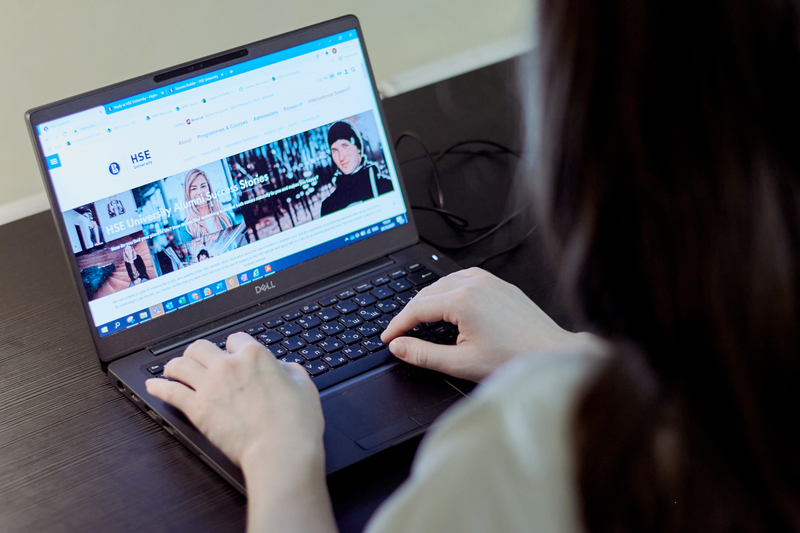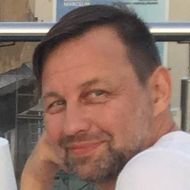‘I Admire HSE Students’ Eagerness to Learn, to Discuss, to Broaden Their Perspectives’

Robert Romanowski was a ‘Digital Professor’ at HSE University in November 2021. In his interview for the HSE News Service, he talked about the specifics of online teaching, his course on Strategic Branding, and the skills that are essential for marketing professionals today.
HSE University’s ‘Digital Professors’ project attracts international experts to teach online at the university. ‘Digital Professors’ deliver online lectures for undergraduate and postgraduate students, supervise their term papers and theses, and develop learning aids.
Since the beginning of the programme, HSE University has invited more than 130 Digital Professors representing around 110 universities and other organisations in 30 countries. All HSE campuses have participated in the programme. Among the specialists involved are academics from the world's leading universities (Stanford, Oxford, the Universities of Michigan, Manchester, Melbourne, and more), as well as practicing entrepreneurs and officials.
Robert Romanowski delivered lectures on Strategic Branding for students of the HSE Graduate School of Business as part of the course ‘Arts and City Communications’.
Robert Romanowski, Associate Professor at the Department of Commerce and Marketing, Poznań University of Economics and Business
My scientific research focuses on three areas: place marketing and branding, innovation management and local development. My current projects help me to understand the implementation of triple, quadruple and quintuple helix models in local development, changes stimulating green and social innovations, and also the development of new delivery formats in the e-grocery sector after the COVID-19 pandemic. What is more, I try to research the influence of the craft beer revolution and the production of luxury alcohol on local sustainable development and sustainable consumption. As a teacher, I specialise in marketing, place branding strategies and innovation management. Moreover, I am a practitioner in consulting and training on local and regional strategic documents, such as local development strategy and regional innovation strategy.
HSE University: Wide Theoretical and Practical Perspectives
I have been cooperating with professor Kirill Rozhkov on place branding since 2015, when we met in Poznań during the Third Place Management and Branding Conference. We were working on a common publication on place branding and that started our didactic collaboration. I admire the wide theoretical and practical perspectives represented by HSE University scientists and it gives me an opportunity to improve my scientific and personal skills.
Online teaching is the reality now. Due to the pandemic, we jumped from the 20th century to the 21st in one year
In my opinion, online teaching is not just a simple copy of the traditional methodology of giving lectures. It relies more on stimulation methods and less on the personal abilities of the lecturer. Online teaching is based more on fast reactions. Both offline and online teaching are based on a good technological background. I think it won’t be possible to use artificial intelligence in teaching for at least a generation.
I gave lectures on Strategic Branding for students of HSE University as part of the course ‘Arts and City Communications’. I admire their eagerness to learn, to discuss, to broaden their perspectives. In the lectures, I showed the procedure and results of the Poznań branding strategy, which was named the best Polish city branding strategy a couple of times. HSE students were well prepared, as were my teacher colleagues. We used the optimal technologies to encourage the students to talk and share their opinions.
Essential Skills for Marketing Experts
One of the professors from my university used to say that two types of skills are needed today: the ability to change human language into machine language and the ability to change machine language into customers’ needs
The first ability is directly connected to computer science professionals, while the second is relevant to new marketing experts. However, understanding customers’ needs and knowing software functionality is not everything for a professional career. I would add that those two professions should have a professional life in good conditions. This means the third useful skill is the ability to create a sustainable environment, which is directly linked with place marketing. I would also suggest one more solution: do what you love. If your job becomes a hobby, it won’t be work anymore.

Kirill Rozhkov, Professor at the Department of Marketing, Graduate School of Business
I met Robert in 2015 at a conference held in his hometown of Poznań in Poland.
Since then, we have been friends; we visit each other and conduct joint research. In 2020, we published a joint article. That is why I thought of him when designing the course in ‘Arts and City Communications’: we have common scientific interests, and the courses we teach are similar. I am also considering re-engaging Robert in the next academic year.
His research seminars were devoted to city branding based on the development of a visual identity for the city of Poznań. The methodology applied in this case was built on an extended brand concept—hence the scientific usefulness of the lecture. The students learned the refined interpretation of the term ‘brand’ and saw why exactly it was introduced, ie how it is applied in practice.
We collected feedback from the students, and those who attended Prof. Romanowski's mini-course rated it as involving, interactive, well structured and developed, and challenging.
If you are interested in cooperating with HSE University as a Digital Professor, please contact Musadin Galachieva at digitalprofessors@hse.ru.
This interview was prepared in November 2021. Photo courtesy of Robert Romanowski.
See also:
Former French Ambassador Shares His Experience with HSE Students as a Digital Professor
As part of the ‘Digital Professors’ programme, HSE University invites international lecturers to work with students remotely. One of the programme’s participants is Dr Pierre Andrieu, lecturer at the Paris Institute of Political Studies (Sciences Po). At HSE University, he taught the elective courses ‘EU in the World’ and ‘New Challenges and Threats’ in 2021–2022. In his interview with the HSE News Service, Dr Andrieu talked about his diplomatic career, research interests, and interactive teaching.
‘In the Last 20 Years, Computer Modelling Has Become an Important Part of Cognitive Science’
As part of its Digital Professors programme, HSE University invites international lecturers to work with students remotely. One of the participants of the programme is Dr Ivan Ivanchei, Research Assistant of the Department of Experimental Psychology at Ghent University (Belgium). He conducted an elective course at HSE University entitled ‘Introduction to Computer Modeling of Cognitive Processes.’
‘Students Have Broadened Their Horizons and Made the First Steps in Financial Mathematics’
Cedric Bernardin from Université Côte d’Azur collaborated with HSE University as a Digital Professor in the second semester of the 2021/2022 academic year. He taught a course on MDP theory with finance applications at the Faculty of Mathematics. Prof. Bernardin shared his impressions of this experience with the HSE News Service.
Pivot to the East: A Comprehensive Study of the Cultural and Civilisational Centres of the Non-Western World is the Top Priority
China and the Chinese world, South Asia, Southeast Asia, the Arab countries, Iran, Turkey, Central Asia and Africa are gaining new significance in Russia’s foreign policy. However, we do not know enough about the Eastern countries. It is necessary to change the priorities in education, starting from grammar school. Prospects for the development of domestic Oriental studies in the context of the new stage in the development of the system of international relations were discussed at a round table at HSE University.
Russia and Africa: Time to Expand Cooperation
There is major potential for economic and humanitarian cooperation between Russia and African countries. Particularly, Russian organisations and universities can help transfer competencies and knowledge in the fields of agriculture, energy, industrial production, environmental management, climate change, and public administration. Experts and representatives of African embassies in Russia discussed these issues at the round table ‘Russia-Africa Sharing Knowledge’ hosted by HSE University.
The Brain in Space: Investigating the Effects of Long Spaceflights on Space Travellers
As part of an international project conducted with the participation of Roscosmos and the European Space Agency, a team of researchers used differential tractography to analyse dMRI scans ofcosmonauts’ brains and found significant changes in brain connectivity, with some of the changes persisting after seven months back on Earth. The paper is published in Frontiers in Neural Circuits.
HSE University-Perm and the Training Centre of the Uzbek Ministry of Finance Sign Cooperation Agreement
HSE University in Perm has become the first academic partner of the Training Centre under the Ministry of Finance of the Republic of Uzbekistan. The parties have signed a cooperation agreement in education and research.
HSE University Strengthens Ties with Netherlands in Agricultural Research and Education
On November 9, 2021, HSE University signed a memorandum of understanding with Wageningen University & Research, a major university in the Netherlands and one of the leading agricultural research institutes in the world. Participants of the signing ceremony included HSE University Rector Nikita Anisimov, President of the Wageningen University & Research Executive Board Professor Louise Fresco, and Dutch Ambassador to Russia Gilles Beschoor Plug.
The Majority of Russians Do Not Support Microchip Implants
The majority of Russians would not agree to being fitted with microchip implants for any purposes—medical or otherwise. A joint study conducted by HSE University’s International Laboratory for Applied Network Research and Aventica found that respondents believe the risks of personal data leaks and misuse to be too high.
‘We Can Now Say That the Finance Conference Is Global’
The 10th International Moscow Finance Conference, organized by HSE ICEF, took place on October 29–30 online. Vladimir Sokolov, Head of the International Laboratory of Financial Economics, which hosted the conference, talks about the participants, the key presentation topics and how they will impact the global economy.


